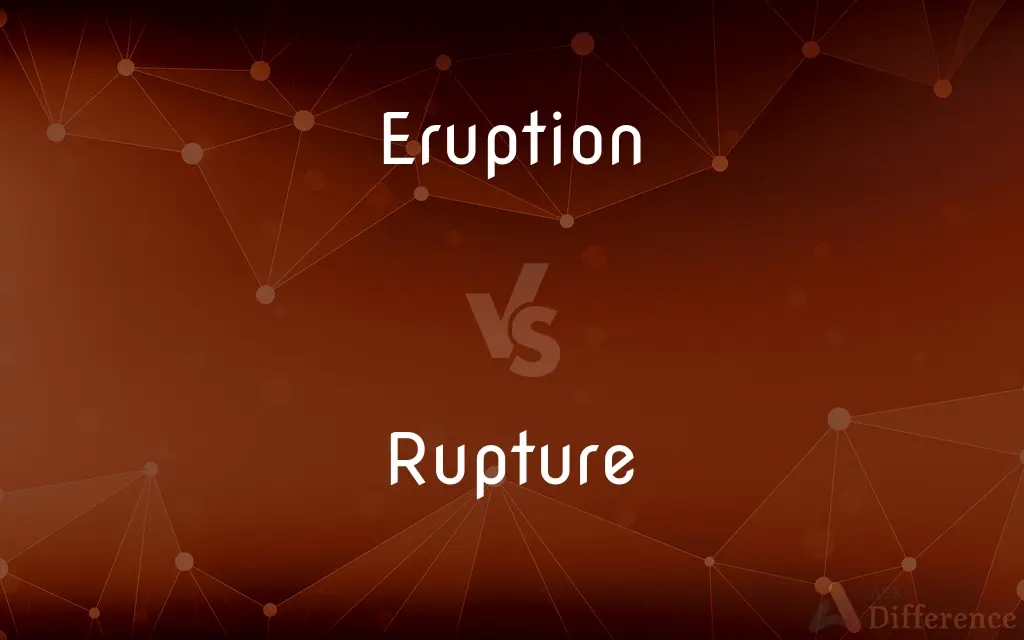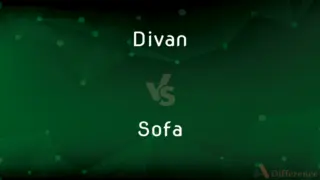Eruption vs. Rupture — What's the Difference?
Edited by Tayyaba Rehman — By Fiza Rafique — Updated on April 2, 2024
An eruption involves the forceful expulsion of materials, often from a volcano or skin lesion, whereas a rupture is a break or tear in an object or tissue, indicating a breach.

Difference Between Eruption and Rupture
Table of Contents
ADVERTISEMENT
Key Differences
An eruption is primarily associated with the violent release of substances, such as lava, ash, and gases from a volcano, or pus and fluid from an abscess, highlighting a process of expulsion driven by internal pressures. On the other hand, a rupture signifies the breaking or tearing apart of something, typically due to pressure, wear, or injury, emphasizing the structural failure of materials or biological tissues.
Eruptions can be natural, as in volcanoes or geysers, showcasing the Earth's geothermal activity by releasing magma, hot water, and steam. These natural events are often predictable to some extent, based on geological assessments. In contrast, ruptures, such as those in aneurysms or hoses, result from weaknesses that give way under pressure, and they can occur suddenly, often with little to no warning, posing significant risks depending on the context.
In dermatology, an eruption refers to a sudden appearance of lesions or blemishes on the skin, which can be due to various causes including infections, allergies, or systemic diseases. This contrasts with a rupture, which could occur in the skin or any organ as a result of trauma or pathological processes, leading to an open wound or internal bleeding.
Eruptions are also found in the context of social and political events, describing sudden outbursts of violence, protests, or emotional reactions among populations or groups. These eruptions are metaphorical, indicating a release of pent-up energies or tensions. Ruptures in this context refer to breaks or collapses in relationships, agreements, or systems, highlighting the disintegration or failure of previously cohesive units.
In terms of management and response, eruptions, especially volcanic, require monitoring, evacuation plans, and sometimes long-term changes in human settlements. The focus is on prediction, preparedness, and mitigation of impact. Ruptures, such as those in pipelines or medical situations, necessitate immediate repair and intervention to prevent further damage or complications, emphasizing the urgency of addressing the breach.
ADVERTISEMENT
Comparison Chart
Definition
Forceful expulsion of materials.
Break or tear in an object or tissue.
Examples
Volcanic eruptions, skin lesions.
Aneurysms, torn ligaments, broken pipes.
Causes
Internal pressures, geothermal activity.
Pressure, wear, injury, structural weaknesses.
Contexts
Geology, dermatology, social events.
Medicine, engineering, relationships.
Management
Monitoring, evacuation, preparedness.
Immediate repair, intervention, mitigation.
Compare with Definitions
Eruption
A volcanic event releasing lava, ash, and gases.
The eruption of Mount Vesuvius in 79 AD buried the cities of Pompeii and Herculaneum.
Rupture
A break in a relationship or system.
The scandal caused a rupture between the allies.
Eruption
An abrupt increase in activity or occurrence.
There was an eruption of technological innovations in the 20th century.
Rupture
The act of breaking or bursting suddenly.
The balloon's rupture startled the child.
Eruption
The sudden appearance of skin lesions.
Measles causes a characteristic skin eruption.
Rupture
A breach of a peaceful or stable condition.
The ceasefire rupture led to renewed hostilities.
Eruption
A sudden, violent outburst of emotions or actions.
The news triggered an eruption of protests across the city.
Rupture
The tearing or breaking of bodily tissue.
The athlete suffered a rupture of the Achilles tendon.
Eruption
The rapid release of steam and water in geysers.
Old Faithful's eruptions are a popular Yellowstone attraction.
Rupture
The failure of a mechanical or structural component.
A rupture in the dam threatened the nearby towns.
Eruption
The act or process of erupting.
Rupture
An instance of breaking open or bursting
A rupture in the fuel line.
Eruption
An instance of erupting.
Rupture
A break in friendly relations.
Eruption
A sudden, often violent outburst.
Rupture
A hernia, especially of the groin or intestines.
Eruption
An appearance of a rash or blemish on the skin.
Rupture
A tear in an organ or tissue
Rupture of an appendix.
Ligament rupture.
Eruption
Such a rash or blemish.
Rupture
To cause to undergo or suffer a rupture
The accident ruptured his spleen.
Eruption
The emergence of a tooth through the gums.
Rupture
To undergo or suffer a rupture
The blister ruptured. Their friendship ruptured.
Eruption
A violent ejection, such as the spurting out of lava from a volcano.
A volcanic eruption
Rupture
A burst, split, or break.
Eruption
A sudden release of pressure or tension.
There was an eruption of joy at the final whistle.
Rupture
A social breach or break, between individuals or groups.
Eruption
An infection of the skin resulting in a rash or blemishing.
Rupture
(medicine) A break or tear in soft tissue, such as a muscle.
Eruption
The act of breaking out or bursting forth;
All Paris was quiet . . . to gather fresh strength for the next day's eruption.
Rupture
(engineering) A failure mode in which a tough ductile material pulls apart rather than cracking.
Eruption
That which bursts forth.
Rupture
(ambitransitive) To burst, break through, or split, as under pressure.
Eruption
A violent exclamation; ejaculation.
He would . . . break out into bitter and passionate eruditions.
Rupture
To dehisce irregularly.
Eruption
The breaking out of pimples, or an efflorescence, as in measles, scarlatina, etc.
Rupture
The act of breaking apart, or separating; the state of being broken asunder; as, the rupture of the skin; the rupture of a vessel or fiber; the rupture of a lutestring.
Hatch from the egg, that soon,Bursting with kindly rupture, forth disclosedTheir callow young.
Eruption
The sudden occurrence of a violent discharge of steam and volcanic material
Rupture
Breach of peace or concord between individuals; open hostility or war between nations; interruption of friendly relations; as, the parties came to a rupture.
He knew that policy would disincline Napoleon from a rupture with his family.
Eruption
Symptom consisting of a breaking out and becoming visible
Rupture
Hernia. See Hernia.
Eruption
(of volcanos) pouring out fumes or lava (or a deposit so formed)
Rupture
A bursting open, as of a steam boiler, in a less sudden manner than by explosion. See Explosion.
Eruption
A sudden violent spontaneous occurrence (usually of some undesirable condition);
The outbreak of hostilities
Rupture
To produce a hernia in.
Eruption
A sudden very loud noise
Rupture
To suffer a breach or disruption.
Eruption
The emergence of a tooth as it breaks through the gum
Rupture
State of being torn or burst open
Rupture
A personal or social separation (as between opposing factions);
They hoped to avoid a break in relations
Rupture
The act of making a sudden noisy break
Rupture
Separate or cause to separate abruptly;
The rope snapped
Tear the paper
Common Curiosities
What is a rupture in medical terms?
In medicine, a rupture refers to the tear or breakage of an organ or tissue, often due to trauma or underlying health issues.
Can eruptions be predicted?
Some eruptions, especially volcanic, can be predicted to an extent with current technology and monitoring techniques.
How do eruptions affect the environment?
Eruptions can have profound effects on the environment, including climate change, air quality issues, and disruption of ecosystems.
How can ruptures in relationships be repaired?
Repairing ruptures in relationships often requires communication, reconciliation efforts, and sometimes professional counseling.
What role do eruptions play in Earth's geology?
Eruptions play a critical role in shaping Earth's surface, forming new land, and releasing gases into the atmosphere.
What are common signs of an impending rupture in a structure?
Common signs include visible cracks, unusual noises, and leaks, indicating structural failure is imminent.
What causes a volcanic eruption?
Volcanic eruptions are caused by the movement of tectonic plates and the buildup of pressure from molten rock beneath the Earth's surface.
What immediate actions should be taken in case of a rupture?
Immediate actions depend on the context but generally involve stopping the breach, preventing further damage, and seeking professional repair or medical attention.
Are all eruptions dangerous?
Not all eruptions are dangerous; for example, skin eruptions can be mild and manageable, whereas volcanic eruptions can be catastrophic.
Can a rupture lead to an eruption?
In a metaphorical sense, a rupture in social or political systems can lead to eruptions of unrest or violence.
How do eruptions contribute to the Earth's atmosphere?
Eruptions contribute gases like carbon dioxide and sulfur dioxide, which can affect climate and air quality.
What preventative measures can be taken to avoid ruptures?
Preventative measures include regular maintenance, monitoring for signs of wear, and avoiding excessive pressures or loads.
What are the long-term impacts of volcanic eruptions on human settlements?
Long-term impacts can include changes in land use, economic disruptions, and health effects from ash and gases.
How do professionals monitor potential eruptions?
Professionals use seismic activity monitors, gas emission measurements, and satellite imagery to predict potential eruptions.
How does the public respond to eruption warnings?
Public responses to eruption warnings vary but typically involve evacuation, emergency preparations, and monitoring of official updates.
Share Your Discovery

Previous Comparison
Divan vs. Sofa
Next Comparison
Guy vs. StayAuthor Spotlight
Written by
Fiza RafiqueFiza Rafique is a skilled content writer at AskDifference.com, where she meticulously refines and enhances written pieces. Drawing from her vast editorial expertise, Fiza ensures clarity, accuracy, and precision in every article. Passionate about language, she continually seeks to elevate the quality of content for readers worldwide.
Edited by
Tayyaba RehmanTayyaba Rehman is a distinguished writer, currently serving as a primary contributor to askdifference.com. As a researcher in semantics and etymology, Tayyaba's passion for the complexity of languages and their distinctions has found a perfect home on the platform. Tayyaba delves into the intricacies of language, distinguishing between commonly confused words and phrases, thereby providing clarity for readers worldwide.















































